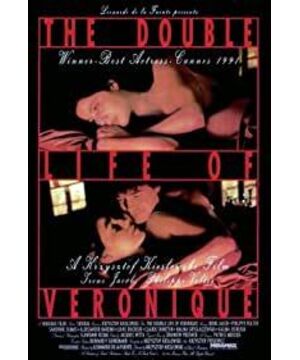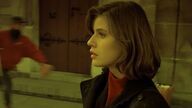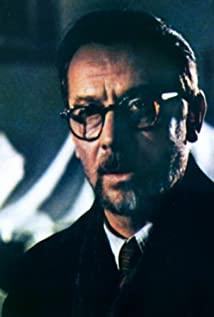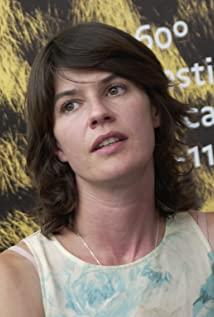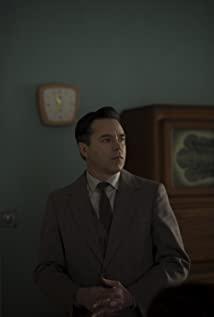"The Double Life of Veronica" is a film with a strong personal character. It is said that "The Double Life of Veronica" has a strong private nature, not because it reflects Kieslowski's private life, but because it expresses extremely secret private meaning. The first time I watched this movie, I didn't understand it at all, and it didn't touch me at all. I almost finished watching it "with patience", but when I watched it the second time, I just admired it, and even thought it impulsively at that moment. "There are only two kinds of women in the world, one who understands this movie and one who doesn't understand this movie" (just kidding).
A Polish girl, a French girl, average age, the same name: Vionika. They have the same natural voice, musical talent and heart disease. Veronica from Poland likes to sing, her voice is beautiful, it flies in the clear rain, she sings to tears, and she wants to have sex with her boyfriend. Veronica of France also likes to sing. One day, Vionika in Poland said to her father: "I have a strange feeling, I don't think I am alone, I am not alone in this world." Driven by this strange feeling, Vionika came to Krakow, in a square, she accidentally saw another woman exactly like her - Vionika from France who came to Poland to travel. But soon, Poland's Vionika died of a heart attack during a concert. And when Poland's Vionika was buried, France's Vionika was having sex with her boyfriend. In the climax of life, "the body that was making love suddenly felt a blade-like sadness", "life and death, sexy and death" It feels like a head-on collision" (Liu Xiaofeng). From then on, the melancholy that seemed to be dead haunted Vionika, and her life experience in the future was like a solitary soul without a body roaming on a strange land...
I think this movie has a strong interpretation of what a woman's sexiness is from the soul and fermented in the body, and the loss of the other half of life and the experience of death are the enzymes for the fermentation of sexiness. That kind of loneliness and consolation, or private living loneliness with no consolation at all, or what the author himself calls "pure emotion." In addition, the intersection of Vionica and the puppeteer in the second half of the film, I think exposes the very likely meanness and shamelessness of male artists, or the possible meanness and shamelessness of art in its very nature, because the creation of works of art It comes from the use of human experience (specifically, in this movie, it is the sexy sadness of Vionika's loneliness), but this human experience is the most secret and life-threatening thing for that specific individual, so such stealing and use Is it ethical or justified? For example, the so-called appreciation of tragedy, but can the tragedy of others be used to be appreciated? Isn't it shameless to steal the precious qualities of human nature to create beauty and aesthetics? I feel that if art cannot have the highest degree of respect and recognition of human nature itself, then such art should be eliminated. So I am particularly disgusted to say "unfortunate poets are lucky in life", what do these things treat people!
In my opinion, the puppeteer is an art criminal who steals the secrets of the soul. He approaches Vionica, attracted by her sensuality, created by the melancholy caused by the awareness of the death of the other half, but he is not He truly understands the inexplicable sexiness mixed with melancholy and death, and only regards it as the perfect artistic material to realize his artistic creation. It can be seen in the movie that Vionika is also attracted to the puppeteer at first, thinking that he really understands the melancholy of her own hidden soul (the puppeteer is an artist who deals with souls all day and is very familiar with this , the artist's artistic perception that is good at capturing the secrets of the soul often makes people mistakenly think that they can understand the secrets of the soul at the same time, but artistic perception and personal knowledge and understanding are two different things), but later found out that it is not, in the end Vionika After discovering that the puppeteer didn't really understand himself, his expression fell into a sad and desolate expression. The puppet show that the puppeteer choreographed at the end may be just another masterpiece of art for him, but for Veonica, it is a real life experience of the soul. The speaker has no intention, the listener has the heart. Vionika felt the secret and pain of her soul stolen and used. It is true that the puppeteer revealed the secret of the double Veronica's soul, but he did not understand it. I think Kieslowski here shows the separation and sharp conflict between art and life itself: is it justifiable for an artist to use a person's fatal pain as the material for art to achieve artistic creation? Can a person's mortal suffering be used as art material? Does an artist have to understand pain firsthand before he has the right to use pain as art material? Don't you see that there are many artists in this world who only use pain, but don't (willing) to understand pain, and this is a great danger for artists.
It's definitely not the theme of the film, but I think it's an important element that reinforces the theme, which is, to put it plainly, a depiction of the individual soul's causality in this world: the joy of discovering one's own soul and knowing one's own soul The melancholy of death at the same time expresses the highest degree of acquaintance and loneliness that a living soul can have. On the one hand, the puppeteer guides Vionica to discover the secret karma of her own soul, and on the other hand, she seems to know that she is inexplicable. The reverse image highlights Veonica's own loneliness and the impossibility of being understood. This is a very metaphysical and absolutely private subject.
View more about The Double Life of Véronique reviews


